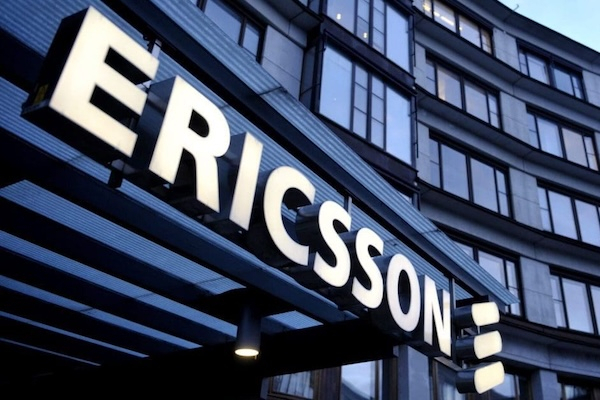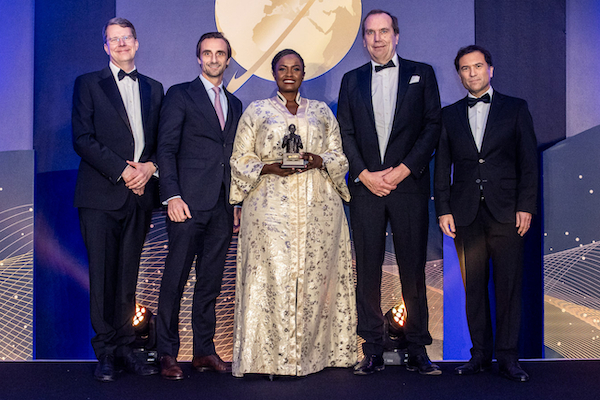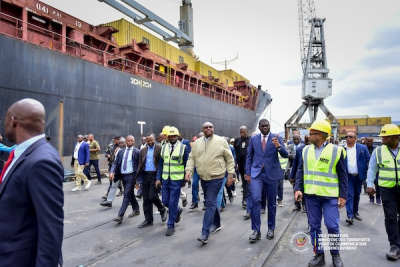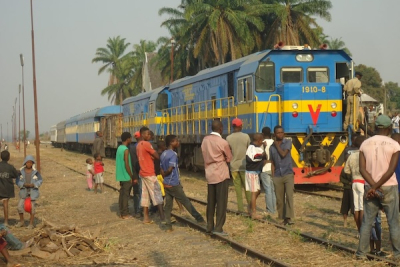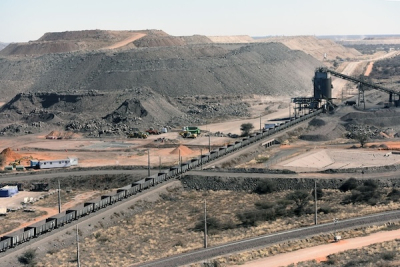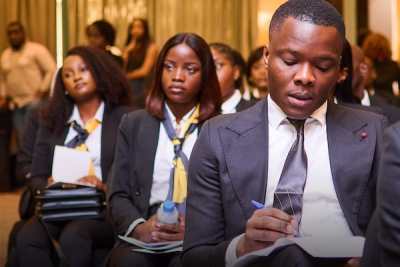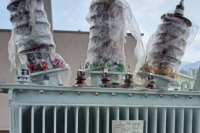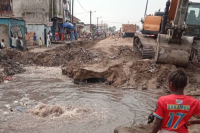
News (638)
Swedish telecom equipment maker Ericsson has closed its office in Kinshasa, ending more than 25 years of operations in the DRC. The decision, dated Nov. 5, 2025, was signed by the company’s representative, lawyer Kevin Wamu, who said the closure follows the end of Ericsson’s activities in the country.
The law firm MBM-Conseil SCA has been appointed to manage the legal steps required for the withdrawal from the DRC. Several lawyers from the firm have been authorized to act on Ericsson’s behalf throughout the process.
Ericsson entered the telecommunications market of the Democratic Republic of Congo in 2000 with an initial contract valued at about 50 million dollars to deploy Celtel’s GSM 900 network, now operated by Airtel. In the years that followed, the company delivered multiple 2G, 3G and 4G network upgrades for Airtel and Vodacom in the DRC.
The shutdown of the Kinshasa office is part of Ericsson’s global restructuring. Since 2022, the company has scaled back its direct presence across several African markets, outsourcing some activities and focusing on higher-margin segments such as 5G, cloud services and critical infrastructure. Industry reports published between 2023 and 2025 noted several rounds of job cuts and the closure of units considered non-strategic.
The withdrawal from the DRC also reflects a shift in the country’s telecom equipment market, where Chinese suppliers Huawei and ZTE now dominate, while the government advances its unified licensing reform and Starlink continues to expand its services within the DRC.
Mobile operators in the Democratic Republic of Congo have historically relied on Ericsson for part of their 2G, 3G and 4G infrastructure. Although the company is closing its office in Kinshasa, it is expected to continue providing regional support for equipment already in place in the DRC.
Ronsard Luabeya
Rawbank has been named the 2025 Bank of the Year for the Democratic Republic of Congo by The Banker, a publication of the Financial Times. The annual award, presented to one institution per country, recognizes outstanding performance across key financial and strategic criteria. Rawbank succeeds Trust Merchant Bank (TMB), which won last year’s edition.
The Banker said its evaluation considers both quantitative and qualitative factors, including financial strength, strategic clarity, innovation, service quality and measurable contributions to the economy.
In explaining its choice, the publication highlighted several of Rawbank’s achievements in 2025. One of the most significant was the completion of a 400-million-dollar syndicated loan to support the third phase of the Kamoa-Kakula copper mine in Lualaba. It is the first time a Congolese bank has led an international financing arrangement of this scale, in partnership with Africa Finance Corporation, Absa and FBN.
Rawbank also advanced its modernization agenda and broadened financing options for domestic companies. Early in 2025, it issued 10 million dollars in commercial paper to support a mining operator in Katanga. The transaction included a corporate guarantee, which is a first in the DRC and expands the financing tools available to local businesses.
In digital services, the bank launched Africa’s first UnionPay renminbi debit card to facilitate transactions between the DRC and China, achieving a 25 percent rise in sales in the first quarter. It also upgraded its Illicocash application by enabling payments through WeChat and Alipay, another first in the Congolese market, and strengthened its agent banking network with improved geolocation capabilities for distributors, merchants and financial advisors. These developments played a significant role in The Banker’s decision.
Rawbank said the recognition builds on other awards it received in 2025, including Best Bank in DRC from the Euromoney Awards. Chief Executive Mustafa Rawji said the distinction reflects the work of the bank’s teams and the confidence of its clients, and reinforces its ambition to help develop a more modern, inclusive and competitive financial sector in the DRC.
Although it lost its position in The Banker’s country awards this year, Trust Merchant Bank also received international recognition in 2025. Global Finance named TMB both Best Bank in DRC and Best SME Bank, citing its support for small and medium enterprises, the expansion of its PEPELE mobile service and the continued growth of its branch network. The bank focused its recent efforts on SME financing, digital services and commercial expansion, while large international deals were less of a priority.
Boaz Kabeya
A major upgrade of port facilities is underway at the Port of Matadi in Kongo Central province, where five quays are scheduled for renovation to improve maritime operations and strengthen the competitiveness of the Democratic Republic of Congo’s principal seaport.
Transport Minister Jean-Pierre Bemba outlined the plans on November 26 during the Makutano Forum in Kinshasa.
He said quays 5, 6 and 7 will be modernized under a concession arrangement negotiated with shipping giant MSC. Matadi Corridor Container Terminals (MCTC), which Bemba described as working directly with MSC on the project, previously announced that it had awarded a 100-million-euro contract to Eiffage Génie Civil Marine for the work.
Quay 9, operated under concession by Dubai-based DP World, will also undergo a full upgrade to improve its infrastructure and expand handling capacity. In addition, Abu Dhabi Ports Group plans to begin operating at Quay 0, where it will be responsible for rehabilitation and extension works, according to the minister.
Bemba also detailed an equipment-upgrade program for the National Office of Transport (ONATRA). Using proceeds from the Land Logistics Royalty (RLT), ONATRA is purchasing new equipment to improve operations. Four quays will receive new machinery, including 30-ton elevators, while two additional 80-ton units are expected early next month.
According to Bemba, these investments will help ONATRA regain its position as a major operator at the Port of Matadi and play a key role in revitalizing the country’s logistics sector.
Ronsard Luabeya
The U.S. International Development Finance Corporation (DFC) said in a statement dated December 5, 2025, that it had issued a Letter of Intent to Mota-Engil, signaling its readiness to help finance the rehabilitation and operation of the Dilolo-Sakania railway line in the Democratic Republic of Congo (DRC).
The move suggests that the Portuguese construction group is emerging as the frontrunner to secure the concession for the Congolese section of the Lobito Corridor, which links the DRC’s mining regions to the Atlantic port of Lobito in Angola.
Mota-Engil, together with Trafigura and Vecturis, forms the Lobito Atlantic Railway (LAR) consortium. The consortium has held a 30-year concession since July 2022 to operate and modernize the Angolan stretch of the corridor. The DRC, however, has not yet publicly announced who will be awarded the concession on its territory.
“What we are trying to do now is get the work started,” said Deputy Prime Minister for Transport Jean-Pierre Bemba on November 26 during a panel at the Makutano Forum. He said discussions are advancing within the strategic steering committee that brings together the DRC, the United States and the European Union.
With backing from the United States, Mota-Engil appears well-positioned in the process. The DFC has said it is prepared to mobilize up to 1 billion dollars for the project. The Dilolo-Sakania rail line is expected to become the main route for Congolese exports to the United States. Under a strategic agreement signed on December 4 between Kinshasa and Washington, public enterprises are expected over the next five years to send 50 percent of their copper, 30 percent of their cobalt and 90 percent of their zinc through the Lobito Corridor.
Economic Stakes
Feasibility studies presented in September by a joint European Union-U.S. expert mission estimate the cost of rehabilitating the Dilolo-Sakania line and extending it toward the Zambian border at about 1.1 billion dollars.
Current financing commitments already surpass that amount. In addition to the 1 billion dollars being considered by the DFC, the European Investment Bank is ready to contribute 500 million euros, and the World Bank is prepared to provide 500 million dollars, according to Bemba.
If implemented, the corridor is expected to give the Port of Lobito a competitive advantage over major regional ports such as Durban (South Africa), Dar es Salaam (Tanzania), Beira (Mozambique) and Walvis Bay (Namibia). Transporting freight from Tenke or Kolwezi to Lobito would take between five and eight days, compared with nearly 25 days for Durban. According to the transport minister, this reduction in transit time could lower logistics costs by up to 30 percent. In the first year of operations, authorities expect export volumes of 1 million tons and import volumes of 500,000 tons.
Bemba added that the corridor could lift the DRC’s GDP by 2 to 3 percent through growth in mining, industrial, agricultural and logistics activities along the route. He also said roughly 10,000 direct jobs could be created during rehabilitation and modernization of the Congolese section.
Pierre Mukoko
Asia Minerals Limited’s planned manganese project in Luozi, in Kongo Central province, will require more than 300 MW of power. The energy needs were outlined at the Makutano Forum on Nov. 26 by Fely Samuna, managing director of Kerith Resources, the DRC-based partner of the Japanese multinational.
He said the project’s power demand is split between roughly 120 MW for mining operations and nearly 200 MW for local processing, in line with the government’s push to increase value addition and jobs in the region. Samuna said this demand would come onstream in more than three years, noting that exploration will take three years before mine development begins. He questioned whether the DRC can meet these requirements.
Aime Molendo Sakombi, Minister of Hydraulic Resources and Electricity, said the area has hydropower sites that could supply the project, including the Mpioka site on the Inkisi River. According to Jean-Pierre Mukadi Kalombo, coordinator of the Energy Ministry’s Project Coordination and Management Unit, the Mpioka site has a potential of about 6,000 MW. He said it could also help supply Kinshasa’s grid, including future expansion, and support growing mining demand. Studies of the site will begin next year to give the government the technical data it needs.
Samuna also raised concerns about the DRC’s energy costs. He noted that the Japanese partner already operates the Pertama Ferroalloys smelter in Malaysia, commissioned in 2016, where it relies on a PPA priced at about $0.04 per kWh. He asked whether a lower rate could be considered in the DRC to ensure the competitiveness of local operations and encourage Asia Minerals to process ore domestically.
In response, Bob Mabiala Mvumbi, director general of the Agency for the Development and Promotion of the Grand Inga Project (ADPI), said he was ready to discuss a future PPA. “You will set a price and we will talk,” he said, noting that ADPI is working on defining bankable demand for Inga 3, which is estimated at 3,000-11,000 MW.
The pricing issue remains challenging. The DRC’s state utility SNEL, which says its current average tariff of $0.17 per kWh is below cost, is seeking a price increase. Mini-grid operators charge between $0.25 and $0.70 per kWh.
Timothée Manoke
Democratic Republic of Congo’s leading bank, Rawbank, closed the sixth round of its RawTalents recruitment and training program for young graduates on Dec. 1. The program is open to candidates under 27 with a bachelor’s or master’s degree obtained within the past three years and an average grade of at least 70 percent.
RawTalents focuses on fields such as economics, law, management, communications, information technology and mathematics. For the 2025 cohort, 115 participants completed the program by presenting their final projects, a required step for final approval and potential hiring by the bank. The intake marks a sharp increase from the 2024 round, which selected 25 participants.
“RawTalents supports young people straight out of university. They are trained in the banking sector to equip them with the tools to build a solid career,” said Rawbank executive Zénas Momonzo.
Over several months, participants received intensive instruction on banking regulations and ethics, interest rate mechanisms, foreign exchange operations, financial product management and the accounting treatment of transactions and investments. They also followed modules on the operational management of banking activities.
Originally launched under the name “Jeunes Universitaires,” the program was renamed RawTalents in 2024 to better reflect its aim of identifying, training and supporting future professionals in the Congolese banking sector. It includes a six-month professional internship before final hiring decisions are made.
The program currently operates in two hubs, Kinshasa in the west and Haut-Katanga in the south, where selected candidates receive structured training and support.
Ronsard Luabeya
Power supplies in the city of Mbuji-Mayi could stabilise in the coming days after a blackout lasting more than three weeks. A new transformer is expected to arrive shortly to replace faulty equipment that caused major power outages.
The 300,000-dollar transformer has already been ordered and is due to arrive at the port of Matadi by Dec. 12, provincial governor Jean-Paul Mbwebwa Kapo said during a programme broadcast on Dec. 3 by state broadcaster RTNC. He said electricity would be restored as soon as possible.
Asked about the issue at the Makutano Forum on Nov. 26, SNEL director-general Teddy Lwamba reiterated that the new transformer would reach Mbuji-Mayi by Dec. 14.
Lwamba said the transformer failure cut the city off from the 3 MW supplied by the Tubi-Tubidi hydropower plant under a power purchase agreement between SNEL and mining company SACIM, which owns the facility. As a result, Mbuji-Mayi is currently running on an 800 kVA thermal plant, far below demand. He added that efforts are under way to raise capacity to 1,300 kVA.
The power shortage has severely disrupted drinking-water supply. To tackle these underlying problems, the head of the water utility REGIDESO, David Tshilumba Mutombo, announced plans to build a solar power plant.
“We have worked for the last three years with German cooperation to secure funding for a 15-megawatt solar plant,” Mutombo said. “The detailed design studies are complete. We hope to begin construction in January so Mbuji-Mayi can become energy independent and ensure continuous water service.”
Boaz Kabeya
Citigroup analysts expect copper prices to rise above 13,000 dollars a ton by the second quarter of 2026, a forecast released last week as the metal continues to hit record highs on global markets. Copper reached 11,620 dollars on December 5 on the London Metal Exchange.
The three-month contract has gained about 30 percent since the start of the year, driven by tightening mine supply and expectations surrounding trade policy under the Trump administration. Citigroup says both factors could continue to support prices into 2026.
In anticipation of potential higher U.S. tariffs on refined copper, traders have been building inventories in U.S. warehouses. According to Bloomberg, about 60 percent of copper held in exchange-monitored storage is now located in the United States, largely at Comex facilities. The concentration of inventories could further tighten the market at a time when several major mines are facing significant disruption.
Weak Mine Supply
In the Democratic Republic of Congo, Ivanhoe Mines and its Chinese partners were forced to revise down production at the Kamoa-Kakula complex after a seismic incident in May 2025. The mine was originally expected to produce at least 500,000 tons in 2025 but now targets a maximum of 420,000 tons, a level also anticipated for 2026. Output is projected to recover to 540,000 tons in 2027.
In Indonesia, a landslide at Grasberg, the world’s second-largest copper mine, led Freeport-McMoRan to suspend part of its operations, prompting a 35 percent cut to its 2026 production outlook. Operational challenges at Chile’s Quebrada Blanca mine have also weighed on output forecasts.
By late November, J.P. Morgan estimated that global supply growth would remain weak this year and reach only about 1.4 percent in 2026, nearly 500,000 tons below its earlier projections.
“All in all, we think these unique dynamics of disjointed inventory and acute supply disruptions tightening the copper market add up to a bullish set up for copper, and are enough to push prices above $12,000/mt in the first half of 2026,” said Gregory Shearer, head of base and precious metals strategy at J.P. Morgan.
Debate Over Shortage Risks
However, new U.S. tariffs are not guaranteed, and any easing of trade tensions could relieve pressure on supply. Analysts at Benchmark Minerals have questioned the likelihood of an actual shortage, suggesting the market may be reacting to speculative signals.
Goldman Sachs does not expect a genuine market deficit before 2029 and forecasts that prices are unlikely to remain above 11,000 dollars a ton for long. BloombergNEF, meanwhile, estimates that the copper market fell into structural deficit as early as 2025, a gap it believes could widen to 19 million tons by 2050.
Emiliano Tossou
The director-general of Regie de distribution d’eau (REGIDESO), David Tshilumba Mutombo, said the public utility sustained significant damage during Kinshasa’s road modernization projects. Speaking on Top Congo FM on December 1, he noted that REGIDESO recorded about 1.4 million dollars’ worth of damaged pipes and more than 8,000 customer disconnections. He also acknowledged a decline in the company’s performance in the second half of 2025.
In October, REGIDESO said it had already sent repair cost estimates to the contractors responsible for the roadworks. Tshilumba added that several cases have now been referred to the courts. “When we go to court, the results are better. Last week, we recovered a payment of 100,000 dollars,” he said.
Meanwhile, the Technical Control Office (BTC) reported in June that progress on certain road projects had been delayed because machinery was repeatedly striking underground installations belonging to the national electricity company SNEL and REGIDESO. “Whenever our equipment hits these installations, we either get cracks or full pipe bursts that cause major leaks. This slows us down because we have to wait for repairs before continuing,” said Emile Imela, BTC’s permanent controller, as quoted by the Congolese Press Agency (ACP).
To improve coordination across public works, the Postal and Telecommunications Regulatory Authority (ARPTC) published a manual of administrative and technical procedures in August. Developed with input from several public agencies, including the Congolese Agency for Major Works (ACGT), the Roads Office, the Road and Drainage Office (OVD), SNEL and REGIDESO, the document aims to standardize how public utility infrastructure is deployed and strengthen coordination among the institutions involved in urban projects.
Timothée Manoke
DR Congo’s state-owned miner Gécamines and Switzerland-based Mercuria Energy Trading announced on Friday the creation of a joint venture to market copper, cobalt and other critical minerals from the Democratic Republic of Congo. According to a joint statement, the new venture is being established with support from the U.S. International Development Finance Corporation (DFC).
On the same day, the U.S. development finance agency said it is considering taking a direct equity stake in the Gécamines-Mercuria venture. The DFC has issued a letter of intent for an equity investment, with the aim of strengthening U.S. supply chains for strategic minerals.
"As part of the investment contemplated under the DFC’s Letter of Intent, the joint venture will grant U.S. end-users a right of first refusal. This provision ensures that American industries, including those in energy, semiconductors and defense, have secure access to critical minerals essential to economic competitiveness and national security," the statement said.
National Interest
The arrangement follows a strategic agreement signed between Washington and Kinshasa on December 4 in the U.S. capital, under which the United States obtained priority access to Congolese strategic minerals. The agreement specifies that the DRC and its state-owned enterprises will use their marketing rights under participation agreements and contracts to grant offtake access to U.S. and allied buyers. In practice, Gécamines or any other public entity must first offer available volumes to American companies, provided the commercial terms align with international market pricing.
Few operational details have been released about the joint venture. However, sources familiar with the matter say Gécamines is expected to retain control. Some observers already view it as a future specialized trading arm for the company, effectively replacing Sozacom, the former state minerals marketer dissolved in the 1990s.
The creation of such a subsidiary is also seen as a way for Gécamines to counter transfer-pricing practices used by some mining companies in which it holds minority stakes. These practices involve selling output at discounted prices to related entities, reducing dividends owed to Gécamines and lowering state mining revenues.
According to the statement, the joint venture aims to secure competitive prices based on transparent international benchmarks.
"This collaboration marks a pivotal step in Gécamines’ effort to strengthen its role in the global metals market. This venture aims to ensure that Congolese copper and cobalt are traded with transparency, fairness and national benefit at the forefront," said Gécamines chairman Guy Robert Lukama.
Mercuria Strengthens Its Position
Mercuria will contribute its global network and expertise in trading, logistics, financing and operations. It will also train Gécamines staff in risk management, trading practices and operational procedures. In addition, Mercuria will provide financing options, including pre-financing and credit backed by offtake contracts.
For Mercuria, the partnership is strategic, offering priority access to volumes of critical minerals and supporting long-term supply flows. It also reinforces the company’s presence in the Copperbelt and in the broader energy metals value chain. The Geneva-based trader signed a similar agreement on October 30, 2025, with Eurasian Resources Group (ERG) to secure copper supplies from the DRC.
Beyond marketing activities, the collaboration will explore investments in logistics infrastructure in the DRC to facilitate the export of strategic raw materials. These investments are intended to strengthen the country’s position on global markets and provide additional growth opportunities for the joint venture.
Under the strategic agreement signed with the DRC, the United States also pledged support for modernizing the Sakania-Lobito corridor. The DFC said it is prepared to provide up to 1 billion dollars in financing for the rehabilitation and operation of the Dilolo-Sakania railway line. The corridor is expected to become the main export route to the United States. Targets have been set: over the next five years, 50 percent of copper, 30 percent of cobalt and 90 percent of zinc marketed by state enterprises must transit through this route.
Pierre Mukoko & Boaz Kabeya
More...
The Democratic Republic of Congo became a "strategic partner" of the United States on Dec. 4, 2025. A formal agreement was signed between the DRC’s Vice Prime Minister and Minister of National Economy Daniel Mukoko Samba and U.S. Secretary of State Marco Rubio. The new status places the DRC within a privileged cooperation framework with Washington. It includes commitments of security support, large-scale investment and accelerated industrialization, but also imposes legal and tax obligations on the DRC under strict deadlines. In return, the United States gains structured and priority access to Congolese critical minerals essential to U.S. industry and the energy transition, while laying the groundwork to reduce China’s influence in the sector.
Priority access to strategic deposits for the United States
The agreement grants U.S. companies a right of first offer on deposits of critical minerals, gold and designated exploration zones grouped under the Strategic Asset Reserve (RAS). This mechanism guarantees priority access to exploration, development or production permits. If no U.S. offer is accepted within nine months, projects may be opened to allies such as the European Union or Qatar, or even to the DRC itself, but never to countries Washington considers strategic rivals. China currently controls around 80 percent of producing mining assets in the DRC.
The list of assets included in the RAS has not yet been made public. According to information obtained, the United States is particularly interested in the Rubaya mine, currently controlled by the M23 armed group, and the Manono deposit, where U.S. firm KoBold Metals already holds four exploration permits. The DRC must transmit the initial RAS list by Jan. 2, 2026. The perimeter may later be expanded in consultation with, or at the request of, the United States, gradually increasing the number of assets that China will not be allowed to access.
Fiscal incentives
A portion of production from RAS assets must be allocated to the U.S. market. Any project proposal must demonstrate a clear contribution to U.S. supply chains, including commitments to channel part of its output to the United States. To guarantee a stable supply, particularly of cobalt, the agreement also provides for the creation of a strategic mineral reserve within the DRC.
Companies with U.S. ownership will benefit from an exceptional fiscal regime that includes a ten-year tax-stability guarantee, mandatory VAT refunds within 90 days and an automatic VAT credit offset system. The DRC must also establish a one-stop shop and a dedicated tax authority for U.S. investors. Additional incentives may be granted to projects classified as strategic, making the fiscal environment highly attractive to American interests.
Washington also gains a direct role in governance. The agreement establishes an intergovernmental dialogue, a U.S.-DRC economic forum and a ten-member Joint Steering Committee (CPC) responsible for supervising projects, validating eligibility criteria and reviewing any decision that could affect U.S. interests, including export quotas or embargoes.
The CPC will meet twice a year, with a first session scheduled no later than 90 days after the agreement enters into force. The economic forum will be held every two years, alternating between Washington and Kinshasa unless otherwise decided. The date of the inaugural session must be set within one year.
The DRC under the American security umbrella
In exchange, the DRC receives official designation as a U.S. strategic partner. This status is reserved for a limited number of countries considered essential to U.S. interests, such as Japan, South Korea and Israel. Analysts say it is likely to strengthen the DRC’s diplomatic weight regionally and internationally.
The agreement also commits Washington to security and defence cooperation aimed at reinforcing peace, stability and state authority. A memorandum of understanding on these matters was signed the same day by DRC Foreign Minister Thérèse Kayikwamba Wagner and Secretary Rubio. The document has not been released, leaving few indications about cooperation on territorial integrity, protection of critical infrastructure and efforts to curb mineral trafficking that finances armed groups.
The agreement also provides targeted support to stabilise mining and conflict zones through investment in energy, infrastructure and logistics, stronger customs and tax capacity, improved mineral traceability and assistance for judicial and anti-corruption reforms designed to restore state authority in mining regions.
Sakania-Lobito corridor and Grand Inga project
Support is already planned to modernise the entire Sakania-Lobito corridor, which is expected to become the main export route to the United States. Quantified targets have been set for state-owned companies. Within five years, 50 percent of copper, 30 percent of cobalt and 90 percent of zinc marketed by these enterprises must transit through this corridor. Both parties also commit to jointly develop the Grand Inga hydroelectric project through a shared governance committee. The project is regarded as central to industrialisation and regional competitiveness.
The agreement also includes support for local mineral processing, including refining and downstream production, as well as a major component on formalising artisanal mining. The United States will support traceability systems, cooperative structuring and financial inclusion for artisanal miners.
Deep reforms required
To consolidate its position as a reliable strategic partner, the DRC must implement policies that strengthen governance, transparency and the rule of law. The agreement requires reform of the fiscal framework within twelve months, including tax stabilisation, VAT refunds within 90 days, a one-stop shop and a centralised tax authority responsible for all interactions with mining investors. In the mining sector, the DRC must also reinforce regulation, improve the transparency of state-owned companies, strengthen customs capacity and combat mineral trafficking.
The agreement enters into force upon signature. It will be reviewed every three years and can only be terminated with five years' notice.
Pierre Mukoko
A tripartite cooperation framework on strategic minerals involving the Democratic Republic of Congo (DRC), the United States and Rwanda was launched in Washington on Dec. 4, 2025.
The Regional Economic Integration Framework (REIF), which serves as the economic pillar of a peace accord, was signed by Kinshasa and Kigali after a preliminary signing on Nov. 7. Alongside the accord, the United States concluded two separate bilateral agreements with the DRC and Rwanda. All documents were signed during a ceremony at the U.S. Institute of Peace attended by Presidents Felix Tshisekedi of the DRC, Paul Kagame of Rwanda and Donald Trump of the United States.
At a press briefing in Washington, Daniel Mukoko Samba, the DRC’s Vice Prime Minister for the National Economy, outlined the purpose of the three-way framework. “As relations between the DRC and Rwanda move toward a more peaceful path centered on shared prosperity, it is also important for the sponsor of this process to secure access to critical metals,” he said. The official added that in today’s geopolitical landscape, access to strategic minerals is essential for any state seeking to become or remain a global power.
Andre Wameso, now Governor of the Central Bank of the Congo and a former economic adviser who took part in negotiations with Rwanda and the United States, said the REIF guarantees that access to strategic resources in eastern DRC will now be negotiated exclusively with national authorities. Wameso argued that the conflict in the country’s east, ongoing for three decades, did not originate from a bilateral dispute between Kinshasa and Kigali but from a Western strategy aimed at bypassing Congolese authorities who opposed the privatization of the mining sector at the time.
A Minerals-for-Security Agreement
The REIF seeks to usher in what Donald Trump described as “a new era of harmony and cooperation” between the DRC and Rwanda by addressing a key driver of the conflict: opaque mineral supply chains. U.S. officials say the framework “unlocks the vast economic potential of the Great Lakes region and creates opportunities for the U.S. private sector.” Commenting on the DRC’s resources, Trump said, “There is tremendous wealth in this land,” adding that U.S. companies would invest in rare earth extraction. “Everybody is going to make a lot of money,” he declared.
A long-discussed “minerals-for-security” pact between Washington and Kinshasa has also been finalized. Congolese officials said two documents were signed: a strategic partnership agreement covering economic and commercial matters, and a memorandum of understanding on security and defense cooperation.
“The relationship between the U.S. and Congolese governments has entered a new phase,” Mukoko Samba said. “Until now, economic ties were governed by an investment protection agreement dating back to 1984. Today, we are strategic partners on economic and trade issues, on defense and security, on science and technology, and on governance.”
Background and Early Moves
Separately, the United States and Rwanda signed the “Shared Economic Prosperity Framework Agreement,” which also addresses strategic minerals, according to press reports. In October 2025, the U.S. received its first shipment of tungsten concentrate from Rwanda, sourced from the Nyakabingo mine and processed in Pennsylvania under a partnership involving Trinity Metals, Global Tungsten & Powders and Traxys.
With Washington and Kinshasa expected to deepen economic ties, several U.S. firms are already active in the DRC, including Kobold Metals in mining and Starlink in satellite internet. The U.S. is also contributing to development of the Lobito Corridor, which links southeastern DRC’s mining regions to the Atlantic coast.
Congolese authorities caution, however, that the triangular cooperation framework can only be fully implemented once peace returns to the country’s east. Despite the signing of the June 27 peace agreement in Washington, violence has recently flared again in South Kivu, leading to new population displacements.
Pierre Mukoko
The U.S. company Minerals Mining Company (Miminco) has had its two operating permits in Kasai province revoked for failing to pay required surface fees. The information appears in a list of forfeiture orders issued by the Ministry and published by the Mining Cadastre (CAMI) on December 2, 2025. Three other companies also lost their mining titles for the same reason. The measure is part of the Congolese government’s effort to strengthen compliance in the mining sector.
Miminco is known for initiating the seizure of a Congo Airways Airbus A320 in Dublin in 2015 as part of a dispute with the Democratic Republic of Congo (DRC). The company accused the state of failing to honor a compensation agreement reached after arbitration.
The dispute stemmed from the occupation of Miminco’s diamond concessions in Kasai, first by members of the Presidential Special Division during the Zaire era, and later by the Alliance of Democratic Forces for the Liberation of Congo (AFDL) under Laurent-Désiré Kabila. After proceedings before the International Centre for Settlement of Investment Disputes (ICSID), the Congolese state agreed in a 2007 settlement to pay the company nearly 13 million dollars. Miminco was founded by Dr. Ilunga Jean Mukend, a Congolese-American physician.
According to CAMI’s register seen by Bankable, the revoked permits were granted on November 21, 2015, after the plane seizure incident. The concessions are located in the Kamonia mining zone in Kasai province. The two cancelled operating permits cover a total of 61 mining blocks.
Under the Mining Code, companies subject to forfeiture orders have 30 days from notification and publication to appeal the decision to the relevant authorities. If no appeal is filed, the forfeiture is entered in the CAMI register and published in the Official Journal, at which point it becomes final.
On September 12, Kasai province signed a memorandum of understanding with CAMI to improve oversight and collection of surface fees on mining concessions and boost provincial revenue. CAMI General Manager Popol Mabolia Yenga said the agreement includes technical and institutional support, data sharing between cadastral systems and training for provincial staff.
Timothée Manoke
DRC plans to adjust water and electricity tariffs that have long been set by ministerial decree and kept below actual production costs. The national utilities, SNEL and REGIDESO, have argued for years that such pricing prevents them from maintaining reliable service and investing in infrastructure upgrades.
Speaking at the Makutano Forum on November 26, 2025, Minister of Hydraulic Resources and Electricity Aimé Molendo Sakombi said he had submitted a memo to the Council of Ministers proposing a six-month emergency plan for REGIDESO. The plan calls for liberalizing tariffs to bring them in line with actual costs and for settling the government’s arrears to the utility.
Asked about electricity, the Minister said the situation was similar. He added that additional memos were being prepared and that the government intended to “take the bull by the horns.” Under the National Energy Compact, the government’s roadmap to raise electricity access from 21.5 percent to 62.5 percent by 2030, the state committed to adopting a tariff regime by January 2026 that would allow SNEL to cover the cost of providing reliable service.
Speaking on Top Congo FM on December 1, 2025, REGIDESO General Manager David Tshilumba said the planned adjustment to the social water tariff would gradually raise it above 0.43 dollars per cubic meter, representing an increase of roughly 80 to 100 percent. He emphasized that the change would be phased in over several years and applied in stages.
Tshilumba added that the Deputy Prime Minister and Minister of National Economy had told him it was time to resolve the issue and that the matter would be addressed through the Council of Ministers.
Below-Cost Pricing
According to Tshilumba, the current tariff for households averages about 0.25 dollars per cubic meter, while the production cost is around 1.15 dollars. He said a cost-reflective tariff is necessary for the company to operate sustainably without heavy state subsidies. Households account for 80 percent of REGIDESO’s water consumption, while commercial and industrial users, who pay more than 2 dollars per cubic meter, represent only 20 percent of demand.
The utility also faces significant unpaid government bills. Tshilumba estimates state arrears at 628 billion Congolese francs. With the settlement of these arrears and the gradual adjustment of tariffs, REGIDESO plans to diversify its activities to expand its revenue base. Water sales currently account for 95 percent of its revenue, according to Bloomfield Investment.
In that context, REGIDESO announced in 2024 the construction of a factory in the Maluku Special Economic Zone to produce pipes and plumbing equipment. Ten hectares have already been allocated to the project, according to Radio Okapi, citing SEZ Agency General Manager Auguy Bolanda. The utility has also created a subsidiary for electricity production, RégiEnergies, and is preparing to launch bottled water sales in Kinshasa.
On the electricity side, SNEL sells power at an average rate of 0.17 dollars per kilowatt-hour under a decree issued on November 5, 2022. When fixed tariffs are included, the National Energy Compact estimates the effective rate at about 0.09 dollars, which remains insufficient to cover production costs.
Mini-grid operators apply authority-approved tariffs that are higher than SNEL’s, ranging from 0.25 to 0.70 dollars per kilowatt-hour, according to the National Energy Compact. Virunga Energies, active in North Kivu, reports selling electricity at 0.25 dollars per kilowatt-hour for households and 0.235 dollars for small and medium-sized businesses.
Pierre Mukoko & Timothée Manoke






